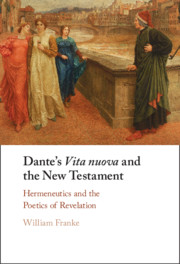Book contents
- Dante’s Vita nuova and the New Testament
- Dante’s Vita nuova and the New Testament
- Copyright page
- Contents
- Illustrations
- Prologue
- Acknowledgments
- Note on Text and Translation
- Chapter 1 Introduction: The Vita nuova as Theological Revelation through Lyrical Interpretation
- Chapter 2 The New Testament Model of Salvific Reminiscence
- Chapter 3 From Appearing and Imagining to Revealing through Interpreting: The Vita nuova’s Hermeneutics of Witness
- Chapter 4 Phenomenology versus Hermeneutics (Debate with Harrison): Revelation as Mediation
- Chapter 5 History of Effect and a New Hermeneutics-Oriented Critical Paradigm
- Chapter 6 Conclusion: The Existential Grounding of Revelation in Lyric
- Coda
- Epilogue: Dream Epistemology and Religious Revelation in Dante’s Vita nuova
- Appendix Italian Text and English Translation of the Vita nuova
- Index
Chapter 6 - Conclusion: The Existential Grounding of Revelation in Lyric
Published online by Cambridge University Press: 03 September 2021
- Dante’s Vita nuova and the New Testament
- Dante’s Vita nuova and the New Testament
- Copyright page
- Contents
- Illustrations
- Prologue
- Acknowledgments
- Note on Text and Translation
- Chapter 1 Introduction: The Vita nuova as Theological Revelation through Lyrical Interpretation
- Chapter 2 The New Testament Model of Salvific Reminiscence
- Chapter 3 From Appearing and Imagining to Revealing through Interpreting: The Vita nuova’s Hermeneutics of Witness
- Chapter 4 Phenomenology versus Hermeneutics (Debate with Harrison): Revelation as Mediation
- Chapter 5 History of Effect and a New Hermeneutics-Oriented Critical Paradigm
- Chapter 6 Conclusion: The Existential Grounding of Revelation in Lyric
- Coda
- Epilogue: Dream Epistemology and Religious Revelation in Dante’s Vita nuova
- Appendix Italian Text and English Translation of the Vita nuova
- Index
Summary
Poetic figuration, by this account, proves to be of the essence of what experience reveals, and it is irreducible to prose sense. Figuration presents an original articulation of the real. Yet, for Dante, this depends on its being interpretable in prose. Prose is necessary to unpack and lay out all that is potential in the poem. Hence his penchant for commentary. Dante’s autobiographical prose, moreover, is necessary to ground the poems in a personal and historical existence from which alone their meaning can grow in all its incarnate potency.
Meaning originates with the poems, but it is illuminated and explicated by the prose. Ultimately, more than their prose meaning, what counts is the inspirational presence that is realized in the poems. The meaning in question is not exactly anything that can be stated as such. It transpires in what happens as recounted in the narrative and in its meditative re-actualization in reading and in re-telling. Hence the silencing of the poet in the book’s concluding chapter (XLII) in face of a predicament that will be developed finally in the Paradiso in terms of the ineffability of his vision. Dante’s little book already contains a distant echo of the biblical Book of Revelation and prefigures the totaling “volume” of the Comedy.
Keywords
- Type
- Chapter
- Information
- Dante's Vita Nuova and the New TestamentHermeneutics and the Poetics of Revelation, pp. 122 - 136Publisher: Cambridge University PressPrint publication year: 2021



